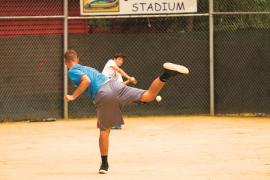“To you much has been given, and from you much is required.” Beyond their Biblical roots, these are certainly words for everyone to live by. Whether part of the year-round or seasonal staff, everyone at camp has a vested interest and shares in its smooth function and safe operation. Unfortunately, people tend to get tunnel vision, approaching their assigned camp tasks with blinders, either unaware or unwilling to step outside their routine to help things work better. Camp leaders can do much to bridge the gaps that develop between cabin counselors, program specialists, and support staff by encouraging — even requiring — that everyone take ownership of the whole camp experience, whether tending to lost campers or caring for the property. Nobody with a conscience would ignore a distressed swimmer, so why would care for the facility be any different? For this special staff training issue, we’re going to learn how we can improve the camp experience for everyone, in ways that aren’t just FREE, but which save money and improve staff morale over time!
Set the Example
Years ago, this brilliant litany was published by a syndicated columnist.
If you get it out, put it up.
If you sleep on it, make it up.
If you wear it, hang it up.
If you drop it, pick it up.
If you dirty it, wash it.
If you open it, close it.
If you turn it on, turn it off.
If it rings, answer it.
If it howls, feed it.
If it cries, love it.
I remember it clearly, because Mom immediately clipped, laminated in clear contact paper, and posted it on the refrigerator where it remained until long, long after my sisters and I had households and families of our own.
It’s a little dated now, since the communal “house telephone” seems to have been lost on the dust heap of history. But these “words to live by” properly haunt my daughters to this day, and I think that there’s little to be lost by imprinting it on staff as well. Your job description contains explicit instructions on how to contribute to the camp machine. Since “setting the example in all things,” is really the core of what’s expected, use this as the base of the checklist. Seeing these things in action could change a life. It did mine!
Thirty-five years ago now, I attended Boy Scout camp without my troop, assigned to “Camp Troop” for the week. Chuck Tomnay led our group and cabin. Each night, he’d empty his pockets — which were full of gum wrappers, candy papers, and other scraps and bits. The first night, the other campers and I wondered how he could eat so much stuff. The second night, someone asked him about it, and he said matter-of-factly that he did NOT eat any of this, but had picked up what he saw. And this was just what he’d seen since dinner. The next day, it was an undeclared contest to see who had the fullest pockets.
Even today, I’m still playing this game, having passed it along to my family as well. Wouldn’t each of us do well to have a legacy like Chuck’s? How far can this go? How much nicer is it to put on a lifejacket that’s been hung up and air dried than one that’s cold and drippy because it’s been lying in a pile? There’s no end to it. At camp, where the impossible happens almost hourly, let’s live for the Louis Armstrong lyric, “What a wonderful world it would be . . . .”
Good Clean Fun?
Some time ago, I toured a camp where the cabins had plywood covers for the windows, which were mounted in slots to allow them to slide out of the way during the summer. They could be lowered if it rained or when the cabins were winterized in the fall. When I remarked that it seemed to be a brilliant solution to a longstanding problem, the facilities director told me that they were a nightmare! A great competition arose between the cabins to see who could drop theirs and make the biggest bang. By the end of the summer, every cabin had at least two covers torn from the side of the building, along with the siding. On several occasions, they’d come dangerously close to falling on campers nearby, yet the director chalked it all up to “harmless fun” and refused to put a stop to it. But how harmless was it really?
That nobody was hurt from falling plywood shutters was little less than a miracle. However, what about the very obvious damage to the buildings? Campers were given license to abuse the property under the “harmless fun” banner. Consider also what message the behavior and endorsement sent to the facilities staff tasked with the repairs. It was unimaginably demoralizing to the maintenance department to be told in no uncertain terms how little their work was valued. Job security for them? Hardly.
Like the graffiti on the newly constructed bunk beds and cabin walls, this was one issue similar to many that said all too loud, “We have no respect for your time or work.” It was the last proverbial straw, and the staff quit en masse. Called to care for all of the resources at our disposal, aren’t we also responsible then to care for the time, energy, skills, and commitment of all of our coworkers? In short, as counselors, you can role model the importance of everyone — coworkers AND campers — ensuring safe, responsible, and considerate care of the facilities that make camp a great place to be!
Ewwwwww!
Along with running water and flushing toilets, clogs are a part of twenty-first century America. And for some reason, camp seems to get more than its fair share of those backed up situations. Though quick action lessens the damage to the property and lowers the chance of spreading disease, that condition seems to ALWAYS be someone else’s job. You’re right: This probably isn’t the realm for campers to dive in and “git r’ dooooone!” but at the same time, if you are trustworthy enough to care for the campers, the most precious resource, you can certainly operate a plumber’s helper. There’s no electricity, moving parts, or extensive training required.
As frontline staff, you are part of the team that sees a problem and takes care of it, Johnny-on-the-spot, in a manner of speaking. Ask those in charge (maintenance staff or your director) how you can help, where you can get the supplies, and what you should do if you notice it again in the future.
On the same token as simply taking action and doing the right thing, consider recognizing campers for random acts of conservation and stewardship — from turning off a dripping faucet to turning off lights nobody is using. Much more effective than negative reinforcement, a pat on the head could change more than the life of the actor, but people around him who also ache for and thrive on the tiniest nuggets of praise.
There’s a catchphrase that says, “Think globally, act locally.” At its core is the idea that everyone can make a difference right where they are, whatever they happen to be doing. Stewardship of the labor, money, and care of others is a cornerstone of the mutual respect that makes society function. Where better than camp to teach that lifelong lesson to the campers than by you, their counselors, leading by example?
Rick Stryker is a professional engineer with a particular passion for helping camps with infrastructure, planning, and regulatory issues. He can always be reached at [email protected] or 570.828.4004.
Originally published in the 2012 May/June Camping Magazine.


